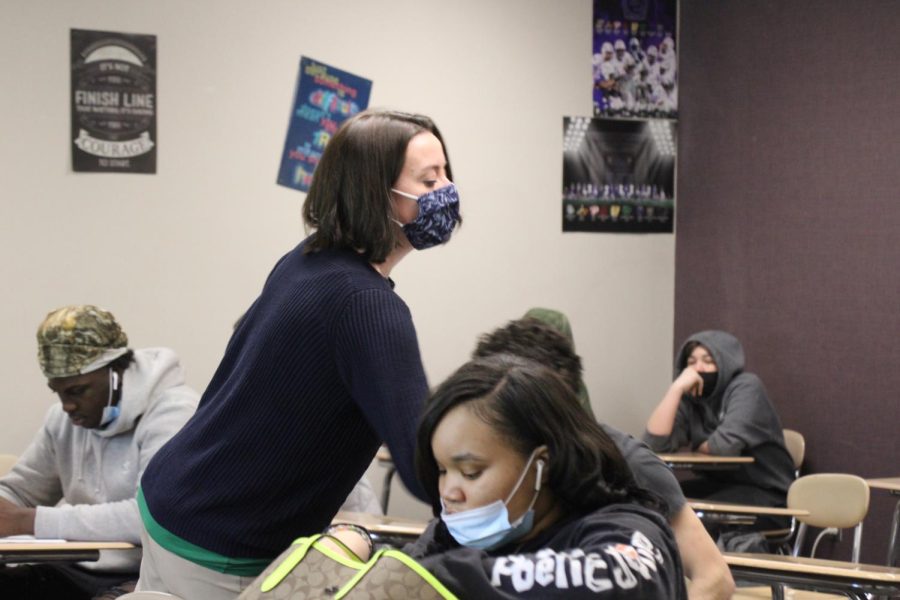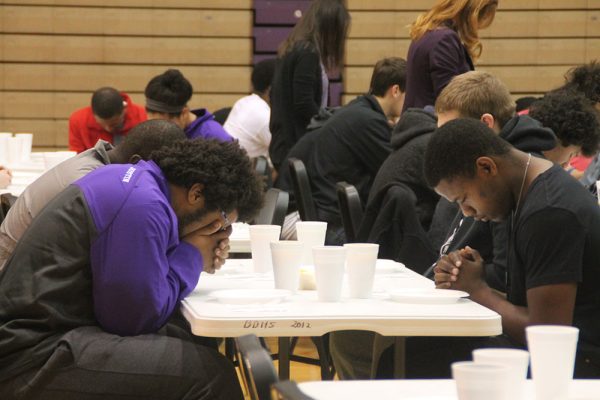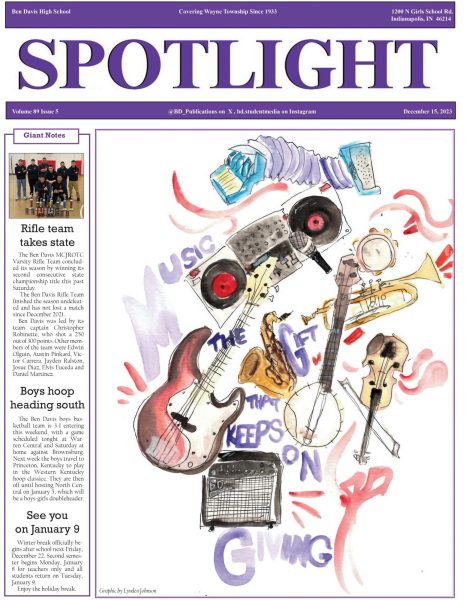Teachers to state: ‘Let us do our jobs’
Math teacher Jessica Breedlove starts a lesson during a recent class.
February 15, 2022
The current state of education in Indiana has recently come under fire due to legislation that is working its way through state government that, if passed, could drastically change the way teachers perform their jobs.
At the center of the debate is House Bill 1134, which is controversial due to its stance on social emotional learning and how schools post their lesson plans, among other things.
“I wish legislators would talk to teachers,” art teacher Allison Knudsen said. “We’re not supposed to be an US vs THEM and I feel it’s that way.
“I want to know we are brainstorming solutions together, from a classroom and legislation perspective. How do they know what is best for students if they aren’t currently in the classroom?”
I want to know we are brainstorming solutions together, from a classroom and legislation perspective. How do they know what is best for students if they aren’t currently in the classroom? — Allison Knudsen
House Bill 1134 has come under fire mainly because it would require all teachers to post lesson plans by June 30th for the following school year. The bill would also create a parent advisory board and would allow parents to “opt out” of certain lessons they might find objectionable.
The bill also would limit how much teachers could discuss social emotional concerns with students and would put constraints on what teachers can discuss in the classroom.
Proponents of the bill claim the bill is so parents can be more involved in their child’s education and there is more consistency across schools.
All schools teach each from a state curriculum that has been approved by state government and is readily available for review on state government websites. Most all school corporations have the state standards posted on their websites and teachers already traditionally pass out class curriculums at the beginning of the school year.
“I am all for transparency, but I think that forcing teachers to post information at the start of the year beyond something like a class syllabus is very taxing, time-consuming and irrelevant to what will happen as the year develops,” radio teacher Jon Easter said. “As many teachers have said, I can tell you what I plan to teach, but that plan sometimes goes right out the window based upon a myriad of factors inside and outside my classroom.
“We also differentiate instruction based on the learners in the classroom, so sometimes I’m teaching a lesson at a variety of levels all at the same time. I don’t know how that will or can be reflected on a website that I post to at the start of the year. Most teachers use Google Classroom or some form of classroom management software that is a more accurate reflection of what’s going on day-to-day in our classrooms than ‘bibliographic’ information would be posted at the start of the year.”
Easter, however, realizes that posting what is being taught is a small part of this legislation.
“I am also concerned about the attack on social emotional learning and diversity, equity and inclusion,” Easter said. “Before a student is ready to learn, they have to know they are valued and loved. They have to know that you care about them, and they have to know that you will be there for them to help them.”
Others agree.
“The fact that I would not be able to discuss with students anything about their mental health, SEL, etc. without prior parental consent is terrifying,” English teacher Melissa Mooney said. “I have had numerous students in my seven years as a teacher and my 12 years as a coach here at Ben Davis approach me simply in need of an ear to listen and a shoulder to cry on. Sometimes, a teacher is the only adult in a student’s life that they feel that they can rely on, especially for those who have difficult home lives. Taking that away could greatly affect the mental health of our students.”
Mooney is not alone.
“There are already ways for parents and the public to be aware of teaching standards of our schools without lesson plans being posted in advance,” math teacher Jessica Breedlove said. “I also feel that learning about multiple perspectives is what public schools are all about – teaching content and about the world and community around you to enhance your societal understanding and contributions.”
Listen to your teachers. We are educated, trained professionals. Talk to those of us currently in the classroom. Collaborate. Listen. Pay attention. — Melissa Mooney
Most teachers want state legislation to work with teachers to improve education.
“I would suggest that the state government listen to the needs of students and teachers directly as they are the most impacted stakeholders,” Breedlove said. “Parents or special interest groups that have the means to homeschool or send their kids to private institutions should not dictate the entire state’s public education curriculum, teacher requirements or student’s opportunities to learn.”
Mooney said this bill makes her scared for her profession.
“I’m honestly scared for myself, my fellow teachers, and our students,” she said, and then offered a suggestion. “Listen to your teachers. We are educated, trained professionals. Talk to those of us currently in the classroom. Collaborate. Listen. Pay attention.”
That sounds like a lesson plan shared by many.
“My personal and professional thoughts are that it’s pretty offensive that I am no longer trusted as a professional to teach a specific curriculum…that, UNLESS I have it planned out for a year and for all to see, that I am not trusted to do my job – the job that I have done for 15 years and the job I was hired for, as a professional, and not questioned until now about my curriculum,” said Knudsen, who was the Ben Davis Teacher of the Year in 2019. “It’s not that I don’t have a semester plan already, but I think that with this bill we HAVE to post it before the school year is offensive and that I am not really trusted to be an effective teacher without proving I have the curriculum planned a year in advance.
“Just because I show a well planned curriculum doesn’t mean I am an effective teacher.”
Teachers are well aware that their profession is not perfect.
“We have challenges in public education, but it seems to me that the answers to those challenges should come from the practitioners of the craft,” Easter said. “Sometimes, I think our General Assembly puts the solution out there for problems that simply do not exist. I would suggest those policy makers listen to teachers, administrators and students rather than coming with some ideas that just are not feasible or provide a fix for something that isn’t an ongoing issue at all.
“I’d also suggest for parents to call and reach out to teachers and administrators whenever they have concerns. This is absolutely a partnership. We don’t need the General Assembly’s legislation to work together for the benefit of our students.”












